Just In
- just now

- 6 hrs ago

- 7 hrs ago

- 11 hrs ago

Don't Miss
- Movies
 Crew Box Office Collection Day 21: Kareena's Film Barely Sees Growth; Crosses Rs 70 Cr In 3 Weeks
Crew Box Office Collection Day 21: Kareena's Film Barely Sees Growth; Crosses Rs 70 Cr In 3 Weeks - Finance
 8 Tata Group Stocks To Buy That Will Pay Dividends Soon, Q4 In Focus; Are You Invested?
8 Tata Group Stocks To Buy That Will Pay Dividends Soon, Q4 In Focus; Are You Invested? - Sports
 Australia Women Cricketer Ashleigh Gardner gets engaged to partner Monica Wright
Australia Women Cricketer Ashleigh Gardner gets engaged to partner Monica Wright - News
 Iran Embassy In Paris Cordoned Off Following Reports Of Suspect With Explosives
Iran Embassy In Paris Cordoned Off Following Reports Of Suspect With Explosives - Automobiles
 Suzuki Swift Hatchback Scores 4 Star Safety Rating At JNCAP – ADAS, New Engine & More
Suzuki Swift Hatchback Scores 4 Star Safety Rating At JNCAP – ADAS, New Engine & More - Education
 NLSIU Announces the Rajiv K. Luthra Foundation Grant
NLSIU Announces the Rajiv K. Luthra Foundation Grant - Technology
 Dell Introduces AI-Powered Laptops and Mobile Workstations for Enterprises in India
Dell Introduces AI-Powered Laptops and Mobile Workstations for Enterprises in India - Travel
 Journey From Delhi To Ooty: Top Transport Options And Attractions
Journey From Delhi To Ooty: Top Transport Options And Attractions
World Health Day 2022: Tips To Make Your Diet A Healthy One
World Health Day is observed on 7 April every year. The global health awareness day is celebrated under the sponsorship of the World Health Organization (WHO). In 1948, in the event of the First World Health Assembly, WHO marked 7 April to be observed as World Healthy Day globally.
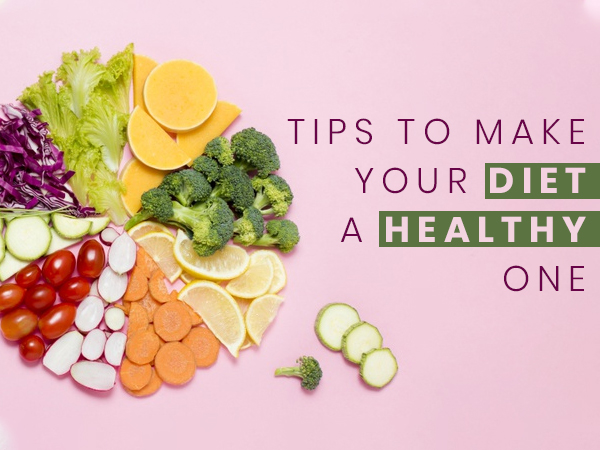
The day marks the founding of WHO along with the raising awareness on the importance of global health. World Health Day is one of the eight official global health campaigns marked by WHO, along with World Tuberculosis Day, World Immunization Week, World Malaria Day, World No Tobacco Day, World AIDS Day, World Blood Donor Day, and World Hepatitis Day [1]. The theme for World Health Day 2022 is 'Our planet, our health'.
On this World Health Day, we will provide you with some easy and simple yet effective tips that would help make your diet a healthy or a healthier one.

Importance Of A Healthy Diet
The type of foods you consume determines the functioning and performance of your body's vital biological processes [4]. Maintaining a healthy diet and following the same is essential to keep yourself healthy. An unhealthy diet encompassed of refined and processed foods can increase your risk of developing health problems such as obesity, gastrointestinal issues, heart health problems among the few [5].
It is critical to have a well-rounded and wholesome diet packed with fibre-rich foods. Because eating, processed, calorie-dense foods, can stress your hypothalamus, pituitary, and adrenal glands - which are responsible for maintaining your hormone balance. These hormones play an important role in the regulation of hunger and fat build-up in the body[6].
The importance of a healthy diet surpasses the need to stay physically healthy. A well-balanced diet help improves not only your physical health but also your mental and emotional health [7].
Consider the following to help improve your daily intake.

1. Choose Whole-Grain Bread Over White Bread
White bread offers little nutritional value, as it is low in fibre, protein, vitamins, minerals, and antioxidants [8]. Switch your refined bread with a whole grain, sprouted type, such as Ezekiel bread which is high in protein and fibre, and the sprouting process may increase the availability of certain nutrients and reduce the bread's effect on your blood sugar levels.
A range of whole-grain bread such as atta bread, multi-grain bread, 100 per cent whole wheat bread, oats bread, multi-fibre bread is some of the options you can include in place of refined white bread [9]. Consult a dietician or your doctor for further clarity on choosing the right kind of alternative for you.

2. Eat Eggs For Breakfast
If you are not a vegetarian or a vegan, this is an excellent breakfast option for you. Eggs are rich in proteins, B vitamins and minerals and help build healthy body and muscles. Have at least one egg in breakfast[10]. Vegans and vegetarians can make a vegan scramble (using tofu instead of eggs) and kale, broccoli, or spinach.
An egg provides about 75 calories, 6 grams of protein and can serve as a versatile ingredient in many recipes. You can scramble them, poach, boil, or eat them as an omelette.
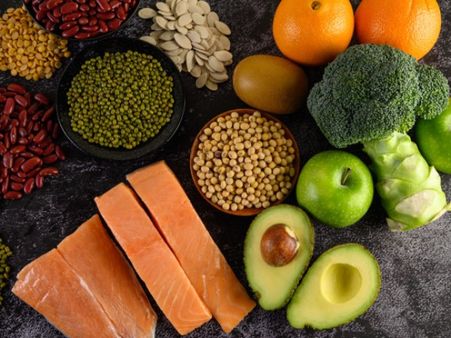
3. Increase Your Protein Consumption
Popularly known as the 'building blocks of a body', protein is one of the most important nutrients that is required for humans to maintain optimum health levels. Proteins are made up of amino acids that help in cell growth and repair - making them an important part of your healthy diet [11][12].
Protein-rich foods take a longer time to be digested in the body in comparison to other foods, thus providing a feeling of fullness which can help reduce overall intake and aid weight loss. There is a misconception that only animal sources can provide the necessary protein that humans need. It is true that animal sources such as eggs, fish, chicken, red and red meat, provide more bioavailable forms of protein but there are plenty of vegetarian sources that can help you meet your daily protein needs as well. Some examples of vegetarian-friendly protein sources are soybeans, tofu, hemp seeds, chia seeds, peanuts (peanut butter), almonds, paneer etc. [13].

4. Drink (Enough) Water
Every human being needs to drink at least 7 to 8 glasses of water daily to hydrate the body. Depending on your stage of life, daily activities, and even geographical location of residence, you may even need more. While drinking enough water is important for your health, it is also important not to drink a large quantity of it - just what is necessary for your bodily functions [14].
Though the kidneys can eliminate about 20-28 litres of water a day, they can't get rid of more than 0.8-1.0 litres per hour, so it is important to not drink more than 0.8-1.0 litres of water per hour on average [15].

5. Avoid Sugary Cereals
A bowl of cereal, often considered a healthier option, can be high in sugar and low in filling macronutrients like protein and fibre. For healthier breakfast alternatives, choose foods such as oatmeal, chia pudding, mixed nuts or yoghurt [16].

6. Skip The Soda For Green Tea
The negative health effects of sweetened soda and other sugary beverages are not a secret. Long-term consumption of these drinks can increase your risk of diabetes, obesity, fatty liver, and metabolic syndrome [17]. Although switching to diet soda is often viewed as an alternative, it may also increase your risk of conditions like metabolic syndrome and stroke [18].
Swap your soda with some unsweetened green tea, lemon tea, ginger tea, camomile tea or black coffee. You can have these beverages hot or cold. Research indicates that coffee and tea are rich in antioxidants that are good for your heart, and hence have the potential to reduce the risk of heart disease and stroke by lowering cholesterol levels and limit your consumption to 2-3 cups per dayto avoid sleep disruption associated with excess caffeine consumption. It is also a good idea to time your caffeine intake away from meals in order to prevent poor nutrient absorption[19][20].
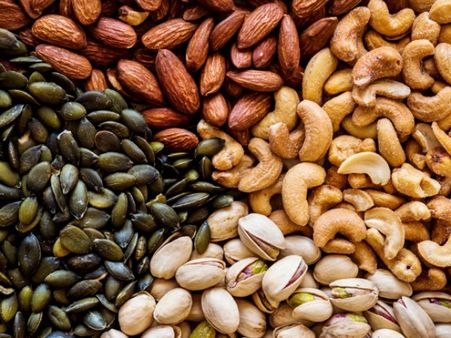
7. No Chips, More Nuts
A bag of chips is high in sodium, starch and often contains unhealthy fats (saturated fat and trans-fat), that can contribute to the build-up of plaque on the inner walls of your arteries and increase your risk of coronary heart disease [21].
Studies suggest that eating nuts may provide protective benefits for the heart, but they are still high in calories, therefore, make sure to consume them in controlled quantities (e.g. ¼ cup) [22]. Some of the best options of nuts are almonds, walnuts, cashews etc.

8. A Combination Of Fruits & Vegetables
As studies point out, an adult is required to eat at least 5 portions of a variety of fruit and veg every day - be it dried, juiced, fresh or cooked [23]. Although it may sound like a task, adding fruits and vegetables (5 A Day) is easy[24][25].
While having your breakfast, add some fruit (banana or apple) or while making that chicken - add some greens and fibre such as broccoli, carrot, capsicum, green beans etc. Do not stick to the traditional modes of cooking and make your diet healthier by adding some fruits and vegetables to common recipes.
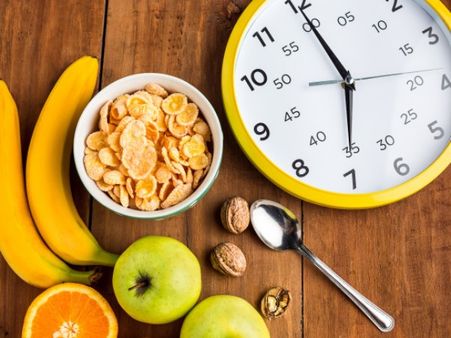
9. Do Not Rush, Eat Slow
It is never advisable to eat your food in a hurry because studies have shown that different eating speeds show that fast eaters are up to 115 per cent more likely to be obese than slow eaters [26]. This is because, as your appetite is controlled by your hormones, eating slowly would give your brain the time it needs to perceive that you are full and in turn, help reduce the amount of food you consume at meals [27].
Chew your food properly to reduce the risk of eating too much and gaining excess weight.

10. Say No To Fast Food - Cook At Home
Although this may seem like a challenging task for most of us, this step is an important one in maintaining a healthy diet and making your existing diet a healthier one. Whatever you eat can be replaced with something more whole, less processed and more nutritious. The "empty calories" that you ingest from sugar, refined foods, saturated fats, preservatives, food additives, etc. in the so-called everyday foods are not good for everyday consumption [28][29].
If you find it difficult to squeeze some cooking time into your schedule, opt for healthy restaurants (which are in plenty now) that offer healthy and tasty meals.

More Tips For A Healthier Diet
Here are some more tips that can make your diet a healthy one
- Make a list before grocery shopping and stick to it [30]
- Add Greek yoghurt to your breakfast and also have it as a mid-day healthy snack [31]
- Avoid fried and grilled foods and opt for baked or roasted [32]
- Make the habit of trying a new healthy food every week
- Chew your fruits and avoid fruit juices [33]
- Eat less salt [34]
- Switch to healthy oils (such as sesame oil, mustard oil, peanut oil, olive oil and avocado oil) [35]
- Sleep well [36]
- Exercise often and maintain a healthy weight [37]
- Do not skip breakfast [38]
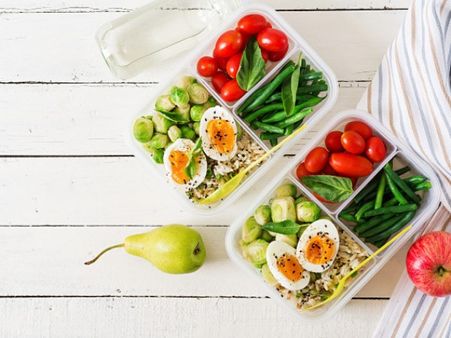
On A Final Note…
Everything you do has an impact on your health. However, you have the power and have an abundance of options to choose sustainably and efficiently - so choose wisely and treat your mind and body right.

-
 healthExclusive: Doctor Shares Why Women Should Prioritize Health, Key Resolutions For Well-being And Vitality
healthExclusive: Doctor Shares Why Women Should Prioritize Health, Key Resolutions For Well-being And Vitality -
 healthWorld Health Day 2024 Wishes: Greetings, Messages, Images, Posters, Texts, Twitter And WhatsApp Status
healthWorld Health Day 2024 Wishes: Greetings, Messages, Images, Posters, Texts, Twitter And WhatsApp Status -
 healthWorld Health Day 2023:Health Tips For Men And Women Above 60 From A Doctor
healthWorld Health Day 2023:Health Tips For Men And Women Above 60 From A Doctor -
 healthWorld Health Day: 4 Ways Ayurveda Can Benefit Your Mind And Body
healthWorld Health Day: 4 Ways Ayurveda Can Benefit Your Mind And Body -
 healthWorld Health Day: Tips For Developing Balanced Eating Habits
healthWorld Health Day: Tips For Developing Balanced Eating Habits -
 wellnessFocus On Affordable Healthcare Ensured Savings For Poor, Middle Class: PM Modi On World Health Day
wellnessFocus On Affordable Healthcare Ensured Savings For Poor, Middle Class: PM Modi On World Health Day -
 wellnessWorld Health Day 2022: How To Help Someone Quit Smoking; Does Support Work? A Step-by-Step Guide
wellnessWorld Health Day 2022: How To Help Someone Quit Smoking; Does Support Work? A Step-by-Step Guide -
 wellnessApollo Hospitals' Report Highlights Impact Of Lifestyle Choices On Health, Well-Being
wellnessApollo Hospitals' Report Highlights Impact Of Lifestyle Choices On Health, Well-Being -
 wellnessObesity Main Reason In 35+ Women For Poor Diabetes Control, Heart Disease Risk: Study
wellnessObesity Main Reason In 35+ Women For Poor Diabetes Control, Heart Disease Risk: Study -
 wellnessExpert Article: Exploring The World Health Day 2022 Theme Through An Ayurveda Perspective
wellnessExpert Article: Exploring The World Health Day 2022 Theme Through An Ayurveda Perspective -
 wellnessWorld Health Day 2022: Date, Theme, History And Significance Of The Day
wellnessWorld Health Day 2022: Date, Theme, History And Significance Of The Day -
 diet fitnessWorld Health Day 2022: Amazing Health Benefits Of Laughter Yoga And How To Perform It
diet fitnessWorld Health Day 2022: Amazing Health Benefits Of Laughter Yoga And How To Perform It


 Click it and Unblock the Notifications
Click it and Unblock the Notifications




